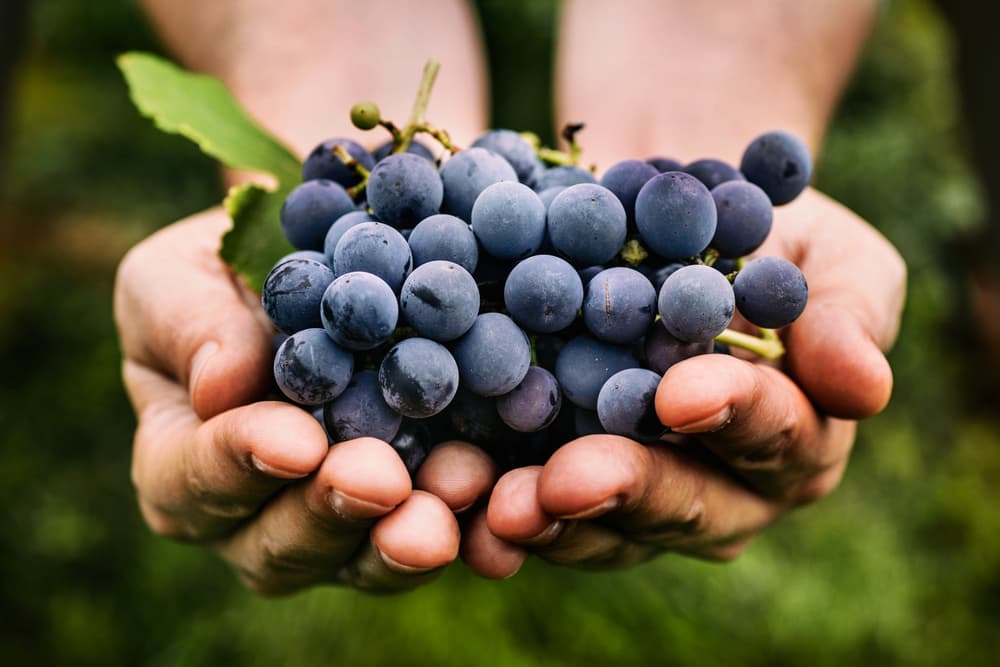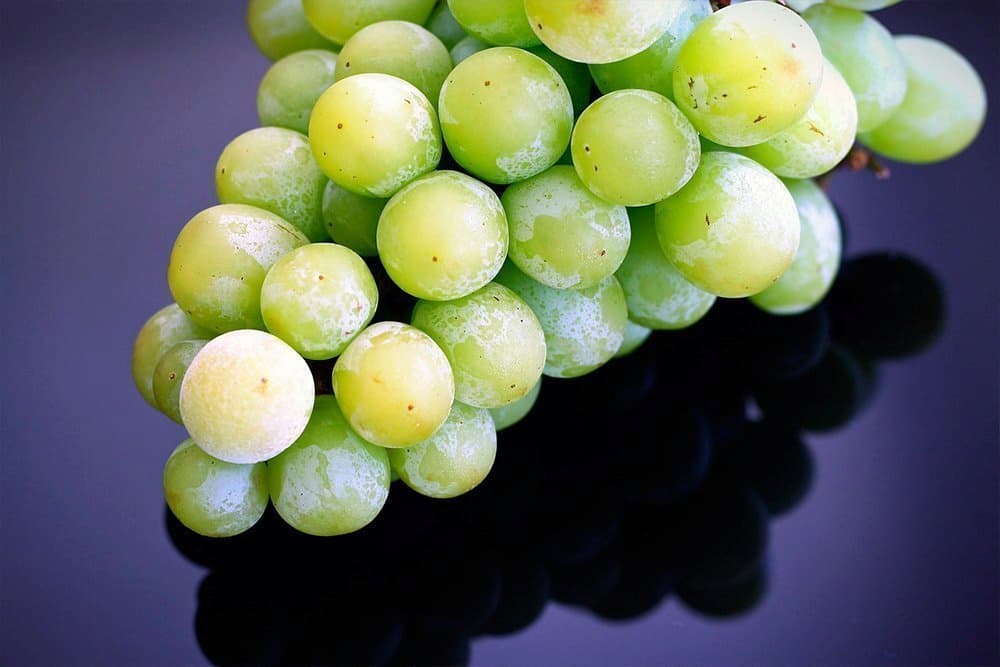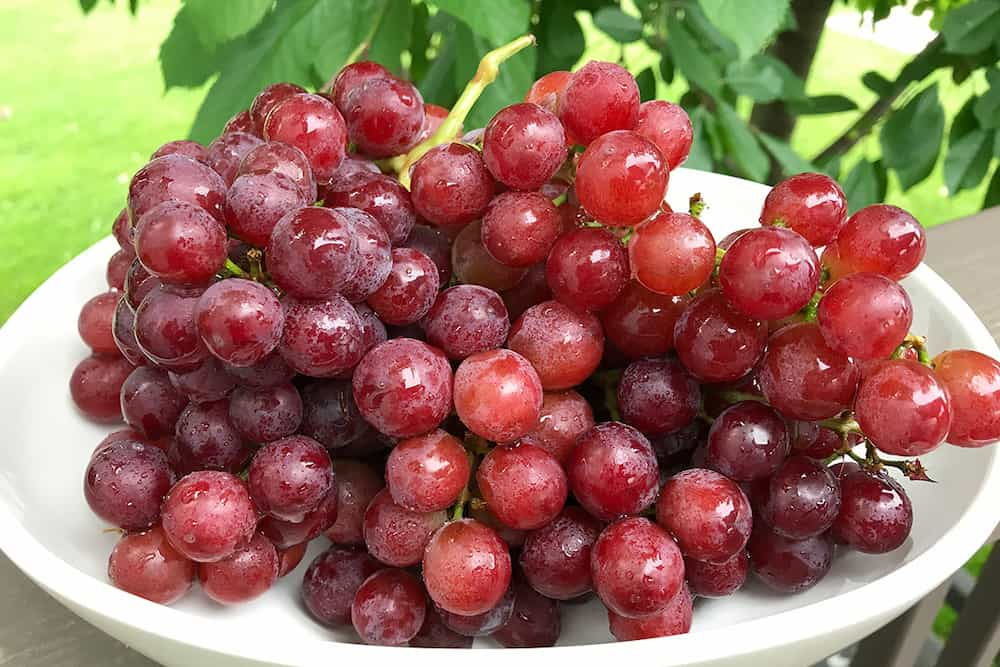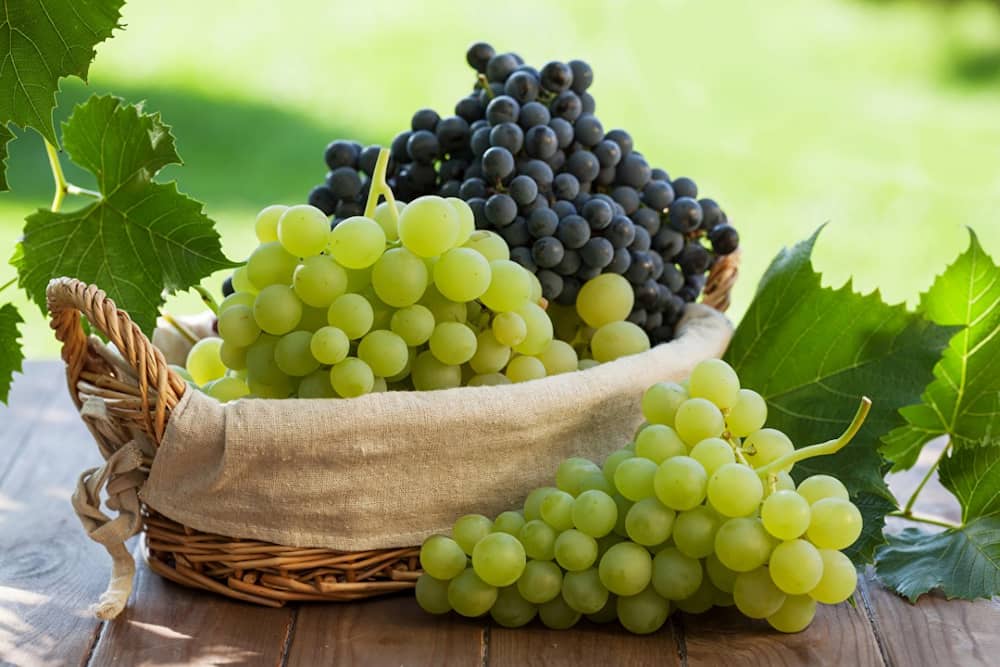we can divide all grapes into two types seedless and seeded, and every type has its features and benefits. Red grapes come in a variety of hues ranging from dark purple to pink. The most popular and common red grape variety in the United States is called raspberry or seedless fire grape, a firm, perfectly round, dark red seedless table grape sold in supermarkets during the fall/winter season. Easy-to-eat seedless red grapes provide an array of nutrients in a low-calorie snack. There are only 29 calories in 1/2 cup of seedless red grapes, making them a smart choice for both weight loss and weight maintenance. With 8 grams of carbohydrates per serving, red grapes are a low-glycemic snack for people on a diabetic diet or restricting their daily carbohydrate intake. One serving contains small amounts of several vitamins, including 5% of adult men's daily vitamin C needs and 6% of women's daily vitamin C needs. Vitamin C is a powerful immune-boosting antioxidant, which in turn may help prevent a range of diseases from cancer to heart disease to macular degeneration, a disease of the aging eye. Red grapes get their coloring from anthocyanins, a type of flavonoid compound. The darker the skin of the grape, the higher the anthocyanin content. Anthocyanins have shown cardioprotective properties in a number of studies.  For example, a longitudinal study published in the journal Circulation in 2013 found that women who ate more than three servings of anthocyanin-containing foods per week reduced their risk of a heart attack. The study focused on other red and blue fruits, but not specifically grapes. Grape skins also contain phytochemical resveratrol, which may be helpful in treating atherosclerosis, a risk factor for heart disease. A small human study published in the International Journal of Cardiology in 2013 found that resveratrol, found in grape skin extracts, improved arterial health in subjects who took the supplement for 30 days. However, larger studies are needed to confirm that resveratrol is an effective treatment for clogged arteries. Resveratrol, found in grape skins, may also be neuroprotective by boosting cognition. In one small study, scientists gave elderly people resveratrol for 26 weeks and looked at how resveratrol affected their brain health. At the end of the study period, cognitive tests showed that the subjects had significantly improved functioning of the hippocampus, the part of the brain linked to memory. The results of the study were published in the Journal of Neuroscience. Red grapes are a versatile product that can be used for more than just a snack. Save the skin to get the most out of this fruit. Add raw grapes and walnuts to an arugula or spinach salad, or add them to Greek yogurt with blueberries and strawberries for a triple dose of anthocyanins. You can also make these: Roast the grapes at 450 degrees for 15 minutes to make a sauce for turkey or chicken. Top baguette slices with goat cheese and roasted grapes for an unusual twist on crostini.
For example, a longitudinal study published in the journal Circulation in 2013 found that women who ate more than three servings of anthocyanin-containing foods per week reduced their risk of a heart attack. The study focused on other red and blue fruits, but not specifically grapes. Grape skins also contain phytochemical resveratrol, which may be helpful in treating atherosclerosis, a risk factor for heart disease. A small human study published in the International Journal of Cardiology in 2013 found that resveratrol, found in grape skin extracts, improved arterial health in subjects who took the supplement for 30 days. However, larger studies are needed to confirm that resveratrol is an effective treatment for clogged arteries. Resveratrol, found in grape skins, may also be neuroprotective by boosting cognition. In one small study, scientists gave elderly people resveratrol for 26 weeks and looked at how resveratrol affected their brain health. At the end of the study period, cognitive tests showed that the subjects had significantly improved functioning of the hippocampus, the part of the brain linked to memory. The results of the study were published in the Journal of Neuroscience. Red grapes are a versatile product that can be used for more than just a snack. Save the skin to get the most out of this fruit. Add raw grapes and walnuts to an arugula or spinach salad, or add them to Greek yogurt with blueberries and strawberries for a triple dose of anthocyanins. You can also make these: Roast the grapes at 450 degrees for 15 minutes to make a sauce for turkey or chicken. Top baguette slices with goat cheese and roasted grapes for an unusual twist on crostini.  Seedless grapes are popular with consumers, with about 8 pounds per capita consumed each year in the United States. Seedless table grapes are commonly grown in home gardens and small farms in New Mexico. Vineyard conditions—soil, climate, and seasonal variations—affect the harvest. However, many viticulture practices can be used to improve or modify the quality of the fruit. These include cultivar and rootstock selection, fertilization, irrigation, weed and pest control, kaolin clay, hormones, trellising, pruning, stem cutting, and grape thinning. These techniques can be used to improve the size and quality of seedless table grapes. Several proposed methods and field test results are presented here. Remember that a combination of methods in the same growing season can produce the best result. The main purpose of grape seeds, as with all types of pome fruit, is plant propagation. They also trigger the release of certain hormones that cause the fetus to grow. These varieties are obtained by hybridization. They also contain small seeds when they start to grow. However, they fade over time, and when the grapes ripen, the pips are so small that we don't even notice them when eating the fruit.
Seedless grapes are popular with consumers, with about 8 pounds per capita consumed each year in the United States. Seedless table grapes are commonly grown in home gardens and small farms in New Mexico. Vineyard conditions—soil, climate, and seasonal variations—affect the harvest. However, many viticulture practices can be used to improve or modify the quality of the fruit. These include cultivar and rootstock selection, fertilization, irrigation, weed and pest control, kaolin clay, hormones, trellising, pruning, stem cutting, and grape thinning. These techniques can be used to improve the size and quality of seedless table grapes. Several proposed methods and field test results are presented here. Remember that a combination of methods in the same growing season can produce the best result. The main purpose of grape seeds, as with all types of pome fruit, is plant propagation. They also trigger the release of certain hormones that cause the fetus to grow. These varieties are obtained by hybridization. They also contain small seeds when they start to grow. However, they fade over time, and when the grapes ripen, the pips are so small that we don't even notice them when eating the fruit. 
seedless grapes
Seedless types of grapes have a rich, juicy flavor without bothersome seeds. Most consumers and growers may not think about the facts about seedless grapes, but when you think about what exactly seedless and seedless grapes are, how are seedless grapes propagated? Read on for answers to these and other questions. If you're worried that seedless grapes are the result of genetic modification or some weird scientific wizardry, relax. In fact, the first seedless grapes appeared as a result of natural (not laboratory) mutation. Viticulturists, noticing this interesting phenomenon, began to grow seedless grapes by planting cuttings. There are two types of grapes: table grapes and wine grapes. Seedless varieties are usually table grapes and are preferably consumed as fresh fruit or raisins. Grapes usually have seeds. While some strains have specific uses, many are used repeatedly and are more popular with home gardeners. Other popular ways to use seedless grapes are to make juice and jam. Thompson Grape: The Thompson grape is a white seedless table grape grown primarily for its raisins. According to the University of California, this grape variety makes up about 95% of the grapes grown in California for raisins. You can also eat Thompson grapes fresh off the vine or use them to make wine and grape juice concentrate.  It is a medium-sized elliptical grape with a thin, crisp skin that dries naturally on the vine. Thompson seedless grapes are grown in Sunset hardiness zones 7 through 14, 18, and 19. Other Popular Varieties: There are many varieties of seedless grapes that grow in Northern California. One of the earliest varieties is Selma Pit, a white grape that ripens in the first week of August. A week later, the white Downie grapes, known for their excellent ability to dry on the vine and become raisins, can be harvested. Fantasy seedless grapes produce large, black table grapes that ripen mid-season. Other seedless strains include Ruby Seedless, Flame Seedless, and Raspberry Seedless. Sweet Scarlet and Tomkord seedless grapes are relatively new varieties of hybrid table grapes. The Sweet Scarlet grape ripens in late August and was developed from more than 10 cultivars, including Fresno, Flame, and Autumn seedless grapes. Red in color with crisp flesh, they retain their firmness and flavor for at least two months after harvest. The Thomcord grape variety is a cross between the Thompson Seedless grape variety and the Concord grape variety. This mildew-resistant grape has a milder flavor and thinner skin than Concord grapes. Seedless grape varieties are propagated using a breeding method called "embryo rescue." You see, seedless grapes aren't seedless.
It is a medium-sized elliptical grape with a thin, crisp skin that dries naturally on the vine. Thompson seedless grapes are grown in Sunset hardiness zones 7 through 14, 18, and 19. Other Popular Varieties: There are many varieties of seedless grapes that grow in Northern California. One of the earliest varieties is Selma Pit, a white grape that ripens in the first week of August. A week later, the white Downie grapes, known for their excellent ability to dry on the vine and become raisins, can be harvested. Fantasy seedless grapes produce large, black table grapes that ripen mid-season. Other seedless strains include Ruby Seedless, Flame Seedless, and Raspberry Seedless. Sweet Scarlet and Tomkord seedless grapes are relatively new varieties of hybrid table grapes. The Sweet Scarlet grape ripens in late August and was developed from more than 10 cultivars, including Fresno, Flame, and Autumn seedless grapes. Red in color with crisp flesh, they retain their firmness and flavor for at least two months after harvest. The Thomcord grape variety is a cross between the Thompson Seedless grape variety and the Concord grape variety. This mildew-resistant grape has a milder flavor and thinner skin than Concord grapes. Seedless grape varieties are propagated using a breeding method called "embryo rescue." You see, seedless grapes aren't seedless.  It produces tiny seeds called embryos that do not mature into full seeds. Instead, the embryos die and become part of the pulp in a process called stenospermocarpy. Grape growers remove the tiny seeds before they die and grow them into mature plants. Grape seedlings Gooseberry Seedlings of grapes the gooseberry is a very commercial variety. Indicated for nuts and raisins. suitable for the market Suitable for fresh products the general product of this grape seedling has similar characteristics to other yellow varieties, the difference is only in the pigments. This variety suffers less from cold and drought, so it is suitable for growing in dry areas. This variety has a good yield but is planted in these areas with rainwater. Red color seedless grape seeds have a very sweet and pleasant taste and sell well in the market. It is one of the oldest and best-selling grape plants in the Iranian market. This variety has good cold tolerance but is not suitable for cold regions. These vine plants can be planted with both rainwater and irrigation. Red seedless grapes have medium red fruits and are used in raisins because they are seedless. The fruits of this variety can be harvested at the end of summer. This vine grows mainly in temperate regions. Introduction to buying seedless red grape plants: Red seedless grapes grow like yellow seedless grapes and have long but colorful branches. The seeds of this grape are red and the fruits are medium in size. The seedling of this grape has dense seeds, the taste is soft, sweet, and juicy. Red seedless grapes are medium-sized varieties that can be harvested in mid-August.
It produces tiny seeds called embryos that do not mature into full seeds. Instead, the embryos die and become part of the pulp in a process called stenospermocarpy. Grape growers remove the tiny seeds before they die and grow them into mature plants. Grape seedlings Gooseberry Seedlings of grapes the gooseberry is a very commercial variety. Indicated for nuts and raisins. suitable for the market Suitable for fresh products the general product of this grape seedling has similar characteristics to other yellow varieties, the difference is only in the pigments. This variety suffers less from cold and drought, so it is suitable for growing in dry areas. This variety has a good yield but is planted in these areas with rainwater. Red color seedless grape seeds have a very sweet and pleasant taste and sell well in the market. It is one of the oldest and best-selling grape plants in the Iranian market. This variety has good cold tolerance but is not suitable for cold regions. These vine plants can be planted with both rainwater and irrigation. Red seedless grapes have medium red fruits and are used in raisins because they are seedless. The fruits of this variety can be harvested at the end of summer. This vine grows mainly in temperate regions. Introduction to buying seedless red grape plants: Red seedless grapes grow like yellow seedless grapes and have long but colorful branches. The seeds of this grape are red and the fruits are medium in size. The seedling of this grape has dense seeds, the taste is soft, sweet, and juicy. Red seedless grapes are medium-sized varieties that can be harvested in mid-August.
